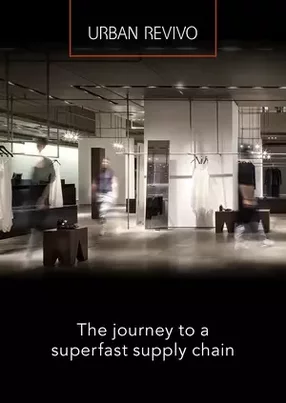“Urban Revivo is a fast fashion company and it was built 11 years ago. The founder of Urban Revivo visited Zara in Japan and then he came up with this idea in China – we didn't have a fast fashion company,” reveals Ethan Zhong, Vice President of Supply Chain. “Urban Revivo is a successful company; it’s grown very fast. It has grown by 50% every year, and now it has around 200 stores in China, and our sales revenue is close to RMB3bn [US$452mn].”
Brands such as H&M and Zara were said to be among the very first fast fashion retailers. When the latter opened its first US store in 1990 – having first launched in Spain in the 1970s – it announced that it would only take 15 days for a garment to go from concept to completion. As Urban Revivo expands internationally – first to Singapore, with the UK in the pipeline for 2018 – there is increased pressure on the company’s supply chain to achieve such short turnaround times.
“Actually, it's a super big challenge for the whole supply chain because we launch more than 20,000 kinds of new products every year. We have a huge timetable and a superfast supply chain. To compare with a traditional fashion company, we launch new products every week. So, our suppliers, we require them to supply those products to us, within around 15 days to 30 days,” Zhong reveals. “We need to prepare some raw materials in advance. We have around 100 small suppliers that have high self-authority and they can support our short lead time. We also use a huge timetable to manage the cross functions and to launch new products every week on time.”
Supporting suppliers
The company announced it would be expanding worldwide when it celebrated its 10th anniversary last year, adding that it had ambitious plans to open around 400 stores globally by 2020, with stores set to follow in Europe as well as more across Asia outside China. As Urban Revivo develops, so must its suppliers. “Most of our suppliers are really small suppliers, because Urban Revivo was growing quite fast in the past. So now, in the future, as part of the supply chain transformation, my key focus is to develop our suppliers,” Zhong observes. “We do our best to support them. We consider them as our key business partners.”
It is not just suppliers that Urban Revivo views as key partners. “For the logistic part we also work with Jingdong,” Zhong notes. “Jingdong, also known as JD.com, is one of the two largest B2C online retailers in China by transaction volume and revenue and a member of the Fortune Global 500. Such a strategic partnership is certainly indicative of Urban Revivo’s growing clout.
“Jingdong is a very big e-commerce company and from this year it wanted to launch its new business of logistics services. Jingdong has very strong capability in its logistics – it's famous for its speed, for its e-commerce platform. In the past, Jingdong Logistics only served its own website, and now they are open to other customers. We have strategic operations with Jingdong this year, and next year they will support all of our logistics service, including the transferring and warehousing,” Zhong advises.
“This is the first year Jingdong opened up its logistics, so they also want to have a strategic partner to have a test case to show to other customers in the future. They give a lot of support to us. We support each other. We grow together.”
See also:
- How Bolloré Logistics is supporting the growth of supply chains and manufacturing in Vietnam
- Migros brings sustainability to Swiss supermarket supply chains
- Okada Manila: Personalised procurement
Investing in automation
According to the Ministry of Human Resources and Social Security of the PRC, the urban unemployment rate in China was 3.95% in Q2 2017. With the employment rates so high, recruiting enough top talent has been a challenge for Urban Revivo as it has expanded. “This year we faced one big challenge. In the peak season, it's quite difficult for our recruitment. We upsized our salary for the casual workers by around 20%, but still we have a labour shortage problem. So now, to be more efficient, we’ve needed to invest in some robots for our warehouse that can help to save the cost,” Zhong notes. “That's the biggest investment for our supply chain in 2017.”
Naturally, Urban Revivo is looking to make further technological investments. “Now we plan to upgrade our supply chain IT system. Because we have a lot of small suppliers, the IT system is very important for us to speed up our supply chain and also cut down the labour cost. We have a lot of associates to collect the order information and communicate this to our suppliers daily, by phone or online support,” Zhong observes. “But now we are working with the IT suppliers to see if we can build an IT platform system to help to monitor the order information and transfer the order information automatically.”
Global growth
Whilst Urban Revivo has achieved much in a short space of time, the company certainly shows no signs of slowing down. “For the next five years we want to grow to more than RMB10bn [US$1.5bn] sales revenue every year. That's our mission,” Zhong states. “And we hope we can break even in the global market two or three years later because this is our first year entering the global market. We’re at the beginning; we still need to learn about the global market – what's their fashion taste? What's their weather like? We’re learning about their behaviours all the time.”
- Cainiao: The World's Largest Ecommerce Logistics ProviderOperations
- Moving manufacturing from China 'impossible for many'Supply Chain Risk Management
- China policy sees Apple CEO Tim Cook go from hero to zeroSupply Chain Risk Management
- China Foxconn iPhone factory an 'albatross' for AppleSupply Chain Risk Management

